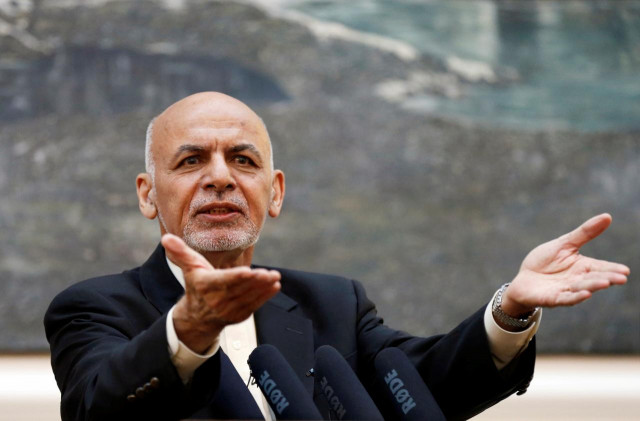Russia reaches out to Afghan leaders for Taliban talks, angering Kabul
Moscow underline increasingly active role Russia is playing in Afghanistan

Afghan President Ashraf Ghani speaks during a news conference in Kabul, Afghanistan July 15, 2018. PHOTO REUTERS
The invitations, extended over the past two months by Russian diplomats in Kabul, were confirmed to Reuters by six of the eight leaders, who include former Afghan President Hamid Karzai, or their aides, and by other leading politicians with ties to the Afghan government.
The Russian Embassy in Kabul declined to comment.
Russia in August proposed holding multilateral peace talks in Moscow and invited 12 countries and the Taliban to attend a summit the following month. But the meeting was postponed after Ghani rejected the invitation on the grounds that talks with the Taliban should be led by the Afghan government.
Pompeo stresses Pakistan's role in bringing Afghan Taliban to talks
The United States had also declined to attend. The US Embassy in Kabul declined to comment further.
Three senior Afghan officials said the government was unhappy that Moscow was pressing ahead with plans for talks.
“We requested Russia to cancel the summit because talking to the Taliban at multiple forums will further complicate the peace process backed by the US, but they rejected the request,” said a senior Afghan official who has been holding discussions with Russia.
Russia’s foreign ministry spokesperson Maria Zakharova said on Thursday that she hoped to be able to announce details of the conference “in the coming days”.
Zakharova told reporters at a briefing that the date and participant list were being finalised, but that Russia wanted to be absolutely sure before announcing anything publicly.
Diplomatic engagement between the Taliban and the United States gained momentum in October after US special envoy for peace in Afghanistan Zalmay Khalilzad met Taliban leaders in Qatar.
But many Afghan politicians say they have been left out of the process.
Karzai, who ran the country for 13 years following the overthrow of the Taliban in 2001 but has become a vocal critic of US policy, is among those planning to travel to Moscow.
“Karzai will travel to Moscow because any opportunity for peace talks with the Taliban must not be ignored,” said Mohammad Yusof Saha, a spokesperson for the former president.
Taliban reject Afghan ceasefire, kidnap nearly 200 bus passengers
Atta Mohammad Noor, a leader in the Jamiat-i Islami party and former governor of the strategic Balkh province, said he too would attend.
Noor, a powerful figure among Afghanistan’s ethnic Tajiks who was once a commander in the anti-Soviet Mujahiddin, said he had no problem with the United States and Ghani holding private talks with the Taliban, “but they cannot decide whether we should talk to the Taliban or not”.
He said many Afghans were realizing that “a single fixed formula prescribed by one foreign power will not help Afghans attain peace”.
Senior Taliban members in Afghanistan said they would send a delegation to Moscow, as it would give them an opportunity to engage with neighbouring countries including China, Iran, Pakistan, Tajikistan, Uzbekistan and Turkmenistan, who have previously said they would send representatives.
“Most countries have acknowledged our status and invited us as a separate political force. This is, in fact, our victory,” said a senior member of the Afghan Taliban.
Moscow’s strategy of going around Ghani directly to opposition politicians is a concern for the Afghan government and its US sponsors, who see it as unwelcome meddling, according to government officials and diplomats in Kabul.
“Russia is trying to create its own regional table to hold peace talks, they are clearly attempting to limit the US role in Afghanistan,” said a western diplomat in the Afghan capital.
The Moscow talks underline the increasingly active role Russia is playing in Afghanistan, decades after Soviet forces withdrew from the country, with business investment plans, diplomatic and cultural outreach, and small military support for the central government.
In 2014, it reopened a cultural centre in Kabul. Since 2016, it has provided thousands of Kalashnikov rifles to the Afghan government, said a senior foreign ministry official in Kabul.
The talks come also at a time when the Afghan government is struggling to recover control of districts lost to Taliban insurgents while casualties among security forces have reached record levels, a US watchdog agency said.
“It’s obvious that the situation in Afghanistan is not improving, that the threat is growing and that the ground is ripe for radical Islamists or followers and participants of the Islamic State project,” said Fyodor Lukyanov, a foreign policy expert close to the Kremlin who edits the Russia in Global Affairs journal.
“The dynamic is negative. I think that’s why political and diplomatic efforts are being activated.”



















COMMENTS
Comments are moderated and generally will be posted if they are on-topic and not abusive.
For more information, please see our Comments FAQ